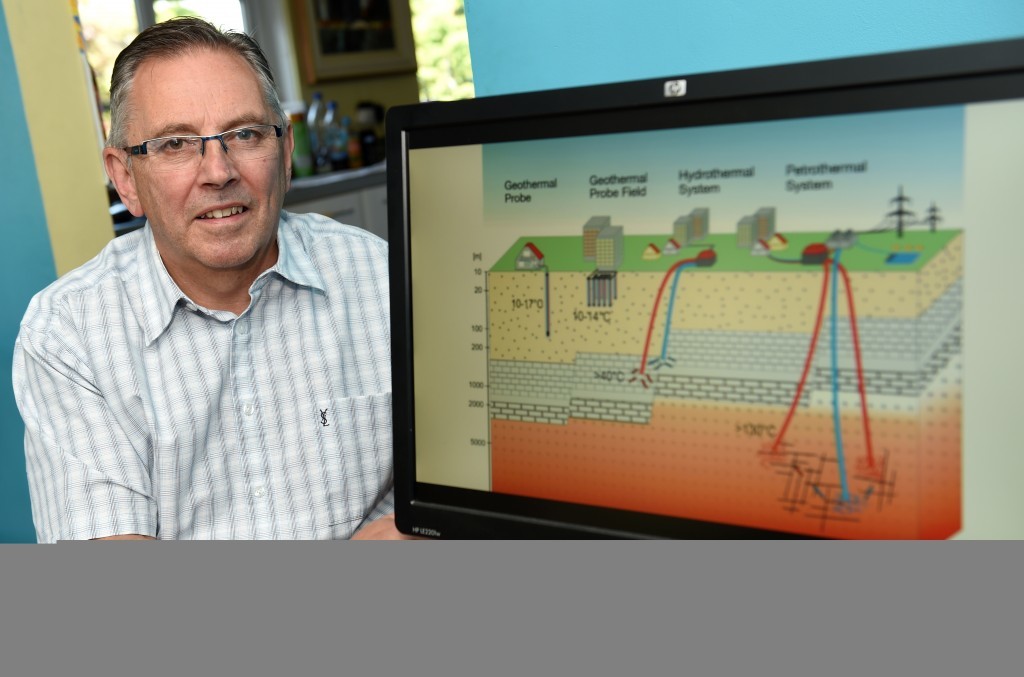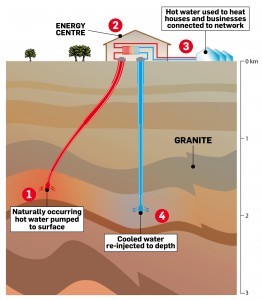
THE north-east could become a goldmine of cheap, environmentally-friendly heating – thanks to one of its most famous natural resources.
Granite has been used to build everything from dry stane dykes to city mansions.
And now the hot water which flows naturally around the rocks could be pumped from deep beneath the ground and used to provide warmth to homes in a Deeside town.
Initial research by geology experts into the potentially “ground-breaking” Hill of Banchory Geothermal Energy Project will start soon.
Surveys by Aberdeen University and the University of Glasgow will begin within two to three weeks at three locations in the town.
The team will aim to identify spots where water flows in the earth naturally heated by granite could be extracted using a drill rig and pumped to local homes.
If the research produces positive results, the water would be channelled into and used alongside the biomass Hill of Banchory district heating scheme managed by Hobesco.
The heat would then be harnessed through a distribution network across the Hill of Banchory area.
If the results of the fieldwork are positive, similar projects could be launched in the wider north-east – which could turn out to be a geothermal goldmine.
Energy Minister Fergus Ewing said the project had the scope to bring affordable, low-carbon heat to households in Banchory.
The project is a joint venture between Jigsaw Energy, Hobesco, Cluff Geothermal Ltd, the British Geological Survey, the universities, Town Rock Energy and Ramboll.
Director of Banchory-based Jigsaw, George Wood, said “colossal amounts of naturally occurring heat” could be beneath the earth’s surface in the area around the town.
He said: “The project is about extracting hot water under the ground heated by granite, which is slightly radioactive, it gives off heat and absorbs heat from the earth’s core.
“Basically you put the water back in the same place. You use the heat, the water goes back again and then replenishes itself.
“We have chosen a number of sites where we can do the tests. We’ll build a map from that and find the most prominent site.
“The whole purpose of the project is to connect the energy source to Banchory. If it is successful we could get the wider area connected.
“In the long term it certainly seems a good way of providing heat, obviously at no cost to the environment.”
He added that assessing the cost of the project, and how much it could potentially save customers, would form part of the next stage of the research and would depend on running costs.
Mr Wood said: “Once it is up and running the costs are very low.”
The first phase of work has been made possible by a £50,000 grant from the Scottish Government’s geothermal energy challenge fund.
Mr Ewing, who is SNP MSP for Inverness and Nairn, said the ideal outcome of the research would be “a delivery model which reduces carbon emissions, is self-sustaining and is economically viable”.
He added: “This is part of the wider approach to support the development of a resilient heat system that enables households, organisations and industry to transition to an affordable low carbon heat system and seize the economic opportunities that this transformation offers.”
Banchory councillor Linda Clark said many people in Banchory said a new solution to heating homes was needed.
She added: “It is an excellent concept. We have to find other ways of heating homes. A lot of homes here use oil and it is expensive and gas is not always available.
“You have to be innovative and forward-thinking and I would like to personally applaud that. We have to do something to find alternatives.”
UK operations manager for Cluff Geothermal Ltd, Michael Feliks, said the first phase of the work was a “feasibility study” for the project.
He added: “When you talk about energy we often just talk about electricity. This is a very good project, a very strong project.
“You have the heat from the granite very close to a developed heat network which could be expanded in the future.
“It has got a very small carbon footprint. We need a good project to get up and running to show people how well it can work. This might be it.”
Alex Burnett, who is managing director of North Banchory Co Ltd, which is behind Hobesco and the Hill of Banchory development, said: “With projects like this, we can be sure to take advantage of our amazing environment to heat our homes without causing harm.”

